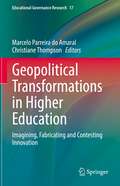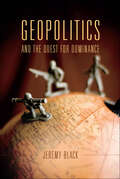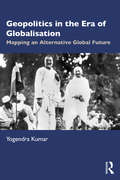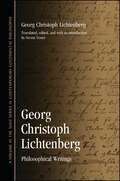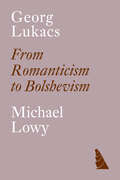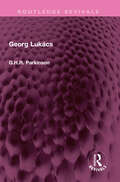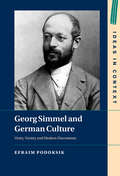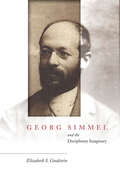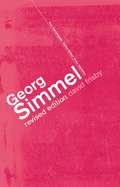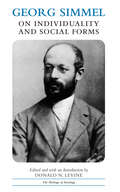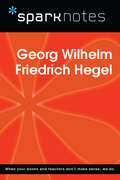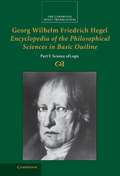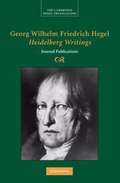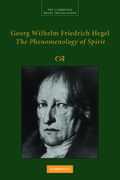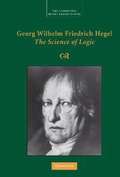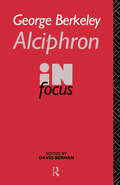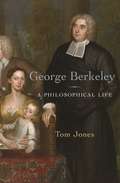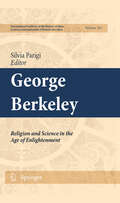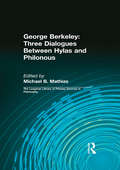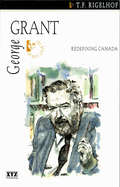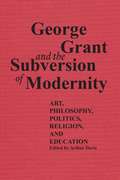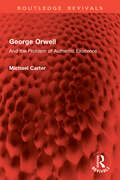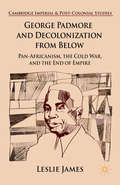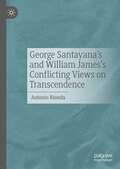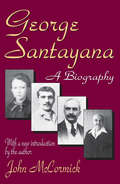- Table View
- List View
Geopolitical Transformations in Higher Education: Imagining, Fabricating and Contesting Innovation (Educational Governance Research #17)
by Christiane Thompson Marcelo Parreira do AmaralThis book discusses the central role education and research play in generating both value and comparative advantages in the (imageries of) global competition, competitiveness and transnational value chains. They are seen as assets placed at the forefront of developments that are arguably reshaping individuals, society and economy. This edited volume explores these developments in terms of changing relations between society, economy, science and individuals. The idea that we live in global knowledge societies and knowledge-based economies or that present-day productive systems constitute an industry 4.0 have gained currency as descriptions of contemporary society that are said to bear direct and indirect consequences for political, economic, and social orders. In this context, innovation, science and education are central themes in contemporary discussions about the future of modern societies. Innovation is enthusiastically embraced as the panacea for all sorts of societal issues of our times; science is equally deemed to play a decisive role in solving current problems and in heralding a bright future with more wealth and more welfare for all citizens; education is conferred the task to producing individuals equipped with both skills and competences considered key to innovation but also displaying the attitudes and dispositions that will secure continuous innovation and economic growth.
Geopolitics and the Quest for Dominance
by Jeremy BlackHistory and geography delineate the operation of power, not only its range but also the capacity to plan and the ability to implement. Approaching state strategy and policy from the spatial angle, Jeremy Black argues that just as the perception of power is central to issues of power, so place, and its constraints and relationships, is partly a matter of perception, not merely map coordinates. Geopolitics, he maintains, is as much about ideas and perception as it is about the actual spatial dimensions of power. Black's study ranges widely, examining geography and the spatial nature of state power from the 15th century to the present day. He considers the rise of British power, geopolitics and the age of Imperialism, the Nazis and World War II, and the Cold War, and he looks at the key theorists of the latter 20th century, including Henry Kissinger, Francis Fukuyama and Samuel P. Huntington, Philip Bobbitt, Niall Ferguson, and others.
Geopolitics in the Era of Globalisation: Mapping an Alternative Global Future
by Yogendra KumarThis book presents an alternative roadmap for a world characterised by geopolitical uncertainty. The surging expectations about a future world of democratic values and high economic growth, born out of superpower bonhomie at the end of the Cold War, did not lead to the promised outcomes. Instead we are faced with deeply destabilising challenges, like climate change, widespread state fragility, terrorism, arms race, disruptive newer technologies, global economic volatility, and ineffectiveness of multilateral institutions, old and new. The volume: surveys the intellectual discourse, the attempts to redesign the global institutions, and the geopolitical trends since the end of the Cold War for an understanding of the contemporary geopolitics, analyses the characteristics of the contemporary geopolitics, the seeming intractability of the global challenges, and the ongoing discourse about preventing their further deterioration, foregrounds the Gandhian praxis and IR theory for managing power transitions anchored in non-violent mobilisation of empowered masses, ensuring institutional resilience, and illustrates them through ongoing conflicts in Iraq and Afghanistan, outlines an approach, based on the Gandhian experience of managing political change, towards conflict, geopolitical uncertainties, and institutional ineffectiveness for securing a better future globally, including South Asia. Accessibly written, this volume will be indispensable for foreign policy experts, government think tanks, and career bureaucrats. It will also be essential for scholars and researchers of international relations, foreign policy, politics, and governance and public policy.
Georg Christoph Lichtenberg: Philosophical Writings (SUNY series in Contemporary Continental Philosophy)
by Georg Christoph LichtenbergAdmired by philosophers such as Schopenhauer, Nietzsche, Kierkegaard, Freud, Benjamin, and Wittgenstein, Georg Christoph Lichtenberg (1742–1799) is known to the English-speaking world mostly as a satirist. An eminent experimental physicist and mathematician, Lichtenberg was knowledgeable about the philosophical views of his time, and interested in uncovering the philosophical commitments that underlie our common beliefs. In his notebooks (which he called his Waste Books) he often reflects on, challenges, and critiques these philosophical commitments and the dominant views of the Enlightenment, German idealism, and British empiricism. This scholarly collection of Lichtenberg's philosophical aphorisms contains hundreds of trenchant observations drawn from these notebooks, many of which have been translated into English here for the first time. It also includes a historical and philosophical introduction to his writings, situating him in the history of philosophy and ideas, and is supplemented with a chronology, suggestions for further reading, and extensive introductory and textual notes explaining his references.
Georg Lukacs: From Romanticism to Bolshevism
by Michael LöwyOn the 100th anniversary of the publication of History and Class Consciousness, a new edition of this indispensable guide to Lukacs's thought and politicsThe philosophical and political development that converted Georg Lukács from a distinguished representative of Central European aesthetic vitalism into a major Marxist theorist and Communist militant has long remained an enigma.In this this now classic study, Michael Löwy for the first time traced and explained the extraordinary mutation that occurred in Lukács's thought between 1909 and 1929. Utilizing many as yet unpublished sources, Löwy meticulously reconstructed the complex itinerary of Lukács's thinking as he gradually moved towards his decisive encounter with Bolshevism.The religious convictions of the early Lukács, the peculiar spell exercised on him and on Max Weber by Dostoyevskyan images of pre-revolutionary Russia, the nature of his friendships with Ernst Bloch and Thomas Mann, were amongst the discoveries of the book.Then, in a fascinating case-study in the sociology of ideas, Löwy showed how the same philosophical problematic of Lebensphilosophie dominated the intelligentsias of both Germany and Hungary in the pre-war period, yet how the different configurations of social forces in each country bent its political destiny into opposite directions. The famous works produced by Lukács during and after the Hungarian Commune—Tactics and Ethics, History and Class Consciousness and Lenin—were analysed and assessed. A concluding chapter discussed Lukács's eventual ambiguous settlement with Stalinism in the thirties, and its coda of renewed radicalism in the final years of his life.In this new edition, Löwy has added a substantial new introduction which reassess the nature of Lukacs's thought in the light of newly published texts and debates.
Georg Lukács (Routledge Revivals)
by G.H.R. ParkinsonFirst published in 1977, Georg Lukács gives an outline of Lukács’ views and explains how they are related to the relevant cultural traditions of his epoch. The author covers the whole range of Lukács’ thought, from his earliest literary criticism to the posthumous Ontology of Social Existence. Lukács’ early writings in particular are frequently obscure in style and impregnated with the language and thought of Hegel. Professor Parkinson has elucidated Lukács’ principal writings in systematic fashion, and the book includes a detailed exposition of Lukács’ influential but difficult book History and Class Consciousness. This should be an indispensable book for all those who seek a clear, comprehensible introduction to the writings of one of the most influential Marxist thinkers of our time.
Georg Simmel and German Culture: Unity, Variety and Modern Discontents (Ideas in Context #135)
by Efraim PodoksikThe significance of the German philosopher and social thinker, Georg Simmel (1858–1918), is only now being recognised by intellectual historians. Through penetrating readings of Simmel's thought, taken as a series of reflections on the essence of modernity and modern civilisation, Efraim Podoksik places his ideas within the context of intellectual life in Germany, and especially Berlin, under the Kaiserreich. Modernity, characterised by the growing differentiation and fragmentation of culture and society, was a fundamental issue during Simmel's life, underpinning central intellectual debates in Imperial Germany. Simmel's thought is depicted here as an attempt at transforming the complexity of these debates into a coherent worldview that can serve as an effective guide to understanding their main parameters. Paying particular attention to the genealogy and usage of the concepts of Bildung, culture and civilisation in Germany, this study offers contextual analyses of Simmel's philosophies of culture, society, art, religion and the feminine, as well as his interpretations of Dante, Kant, Nietzsche, Schopenhauer, Goethe and Rembrandt.
Georg Simmel and the Disciplinary Imaginary
by Elizabeth GoodsteinAn internationally famous philosopher and best-selling author during his lifetime, Georg Simmel has been marginalized in contemporary intellectual and cultural history. This neglect belies his pathbreaking role in revealing the theoretical significance of phenomena—including money, gender, urban life, and technology—that subsequently became established arenas of inquiry in cultural theory. It further ignores his philosophical impact on thinkers as diverse as Benjamin, Musil, and Heidegger. Integrating intellectual biography, philosophical interpretation, and a critical examination of the history of academic disciplines, this book restores Simmel to his rightful place as a major figure and challenges the frameworks through which his contributions to modern thought have been at once remembered and forgotten.
Georg Simmel: Critical Assessments (Key Sociologists)
by David FrisbyUntil recently little of Simmel's work was available in translation and certain key texts were unknown outside Germany. David Frisby, the eminent Simmel scholar, provides not only an introduction to the major sociological writings of this important figure, but also an argument for a reconsideration of his work. The author outlines the cultural and historical context in which Simmel worked; reviews Simmel's most important writings; and examines his legacy to sociology by illuminating his links with Weber's theories and his influential relationship with Marxism.Simmel, a central figure in the development of modern sociology, and a contemporary of Weber and Durkheim, was one of the first to identify sociology as a separate discipline. His ideas influenced Weber, the Chicago School, and many later sociologists. His introduction of a number of basic concepts to sociology, such as exchange, interaction and differentiation, attest to his intellectual stature and the far-reaching significance of his work.
Georg Simmel: On Individuality and Social Forms
by Georg Simmel Donald N. Levine"Of those who created the intellectual capital used to launch the enterprise of professional sociology, Georg Simmel was perhaps the most original and fecund. In search of a subject matter for sociology that would distinguish it from all other social sciences and humanistic disciplines, he charted a new field for discovery and proceeded to explore a world of novel topics in works that have guided and anticipated the thinking of generations of sociologists. Such distinctive concepts of contemporary sociology as social distance, marginality, urbanism as a way of life, role-playing, social behavior as exchange, conflict as an integrating process, dyadic encounter, circular interaction, reference groups as perspectives, and sociological ambivalence embody ideas which Simmel adumbrated more than six decades ago. "—Donald N. Levine Half of the material included in this edition of Simmel's writings represents new translations. This includes Simmel's important, lengthy, and previously untranslated "Group Expansion and Development of Individuality," as well as three selections from his most neglected work, Philosophy of Money; in addition, the introduction to Probleme der Geschichtsphilosophie, chapter one of the Lebensanschauung, and three essays are translated for the first time.
Georg Wilhelm Friedrich Hegel (SparkNotes Philosophy Guide)
by SparkNotesGeorg Wilhelm Friedrich Hegel (SparkNotes Philosophy Guide) Making the reading experience fun! SparkNotes Philosophy Guides are one-stop guides to the great works of philosophy–masterpieces that stand at the foundations of Western thought. Inside each Philosophy Guide you&’ll find insightful overviews of great philosophical works of the Western world.
Georg Wilhelm Friedrich Hegel: Encyclopaedia of the Philosophical Sciences in Basic Outline, Part 1, Logic
by Klaus Brinkmann Daniel O. Dahlstrom Georg Wilhelm Friedrich HegelHegel's Encyclopaedia Logic constitutes the foundation of the system of philosophy presented in his Encyclopaedia of the Philosophical Sciences. Together with his Science of Logic, it contains the most explicit formulation of his enduringly influential dialectical method and of the categorical system underlying his thought. It offers a more compact presentation of his dialectical method than is found elsewhere, and also incorporates changes that he would have made to the second edition of the Science of Logic if he had lived to do so. This volume presents it in a new translation with a helpful introduction and notes. It will be a valuable reference work for scholars and students of Hegel and German idealism, as well as for those who are interested in the post-Hegelian character of contemporary philosophy.
Georg Wilhelm Friedrich Hegel: Journal Publications
by Brady Bowman Allen SpeightThis work brings together, for the first time in English translation, Hegel's journal publications from his years in Heidelberg (1816-18), writings which have been previously either untranslated or only partially translated into English. The Heidelberg years marked Hegel's return to university teaching and represented an important transition in his life and thought. The translated texts include his important reassessment of the works of the philosopher F. H. Jacobi, whose engagement with Spinozism, especially, was of decisive significance for the philosophical development of German Idealism. They also include his most influential writing about contemporary political events, his essay on the constitutional assembly in his native Württemberg, which was written against the background of the dramatic political and social changes occurring in post-Napoleonic Germany. The translators have provided an introduction and notes that offer a scholarly commentary on the philosophical and political background of Hegel's Heidelberg writings.
Georg Wilhelm Friedrich Hegel: The Phenomenology of Spirit (Cambridge Hegel Translations)
by Michael Baur Georg Wilhelm Friedrich Hegel Terry PinkardHegel's Phenomenology of Spirit (1807) is one of the most influential texts in the history of modern philosophy. In it, Hegel proposed an arresting and novel picture of the relation of mind to world and of people to each other. Like Kant before him, Hegel offered up a systematic account of the nature of knowledge, the influence of society and history on claims to knowledge, and the social character of human agency itself. A bold new understanding of what, after Hegel, came to be called 'subjectivity' arose from this work, and it was instrumental in the formation of later philosophies, such as existentialism, Marxism, and American pragmatism, each of which reacted to Hegel's radical claims in different ways. This edition offers a new translation, an introduction, and glossaries to assist readers' understanding of this central text, and will be essential for scholars and students of Hegel.
Georg Wilhelm Friedrich Hegel: The Science of Logic
by George Di Giovanni Georg Wilhelm Friedrich HegelThis new translation of The Science of Logic (also known as 'Greater Logic') includes the revised Book I (1832), Book II (1813), and Book III (1816). Recent research has given us a detailed picture of the process that led Hegel to his final conception of the System and of the place of the Logic within it. We now understand how and why Hegel distanced himself from Schelling, how radical this break with his early mentor was, and to what extent it entailed a return (but with a difference) to Fichte and Kant. In the introduction to the volume, George di Giovanni presents in synoptic form the results of recent scholarship on the subject, and, while recognizing the fault lines in Hegel's System that allow opposite interpretations, argues that the Logic marks the end of classical metaphysics. The translation is accompanied by a full apparatus of historical and explanatory notes.
George Berkeley Alciphron in Focus (Philosophers in Focus)
by David BermanAlciphron, or the Minute Philosopher (1732) is Berkeley's main work of philosophical theology and a crucial source of his views on meaning and language. This edition contains the four most important dialogues and a selection of critical essays and commentaries reflecting the response of such writers as Hutcheson, Mill and Antony Flew. The only single edition currently in print, it argues that Alciphron has a more important place both in the Berkeley canon and in early modern philosophy than is generally thought.
George Berkeley: A Philosophical Life
by Tom JonesA comprehensive intellectual biography of the Enlightenment philosopherIn George Berkeley: A Philosophical Life, Tom Jones provides a comprehensive account of the life and work of the preeminent Irish philosopher of the Enlightenment. From his early brilliance as a student and fellow at Trinity College Dublin to his later years as Bishop of Cloyne, Berkeley brought his searching and powerful intellect to bear on the full range of eighteenth-century thought and experience.Jones brings vividly to life the complexities and contradictions of Berkeley’s life and ideas. He advanced a radical immaterialism, holding that the only reality was minds, their thoughts, and their perceptions, without any physical substance underlying them. But he put forward this counterintuitive philosophy in support of the existence and ultimate sovereignty of God. Berkeley was an energetic social reformer, deeply interested in educational and economic improvement, including for the indigenous peoples of North America, yet he believed strongly in obedience to hierarchy and defended slavery. And although he spent much of his life in Ireland, he followed his time at Trinity with years of travel that took him to London, Italy, and New England, where he spent two years trying to establish a university for Bermuda, before returning to Ireland to take up an Anglican bishopric in a predominantly Catholic country.Jones draws on the full range of Berkeley’s writings, from philosophical treatises to personal letters and journals, to probe the deep connections between his life and work. The result is a richly detailed and rounded portrait of a major Enlightenment thinker and the world in which he lived.
George Berkeley: Religion and Science in the Age of Enlightenment
by Silvia ParigiGeorge Berkeley was considered "the most engaging and useful man in Ireland in the eighteenth century". This hyperbolic statement refers both to Berkeley's life and thought; in fact, he always considered himself a pioneer called to think and do new things. He was an empiricist well versed in the sciences, an amateur of the mechanical arts, as well as a metaphysician; he was the author of many completely different discoveries, as well as a very active Christian, a zealous bishop and the apostle of the Bermuda project. The essays collected in this volume, written by some leading scholars, aim to reconstruct the complexity of Berkeley's figure, without selecting "major" works, nor searching for "coherence" at any cost. They will focus on different aspects of Berkeley's thought, showing their intersections; they will explore the important contributions he gave to various scientific disciplines, as well as to the eighteenth-century philosophical and theological debate. They will highlight the wide influence that his presently most neglected or puzzling books had at the time; they will refuse any anachronistical trial of Berkeley's thought, judged from a contemporary point of view.
George Berkeley: Three Dialogues Between Hylas and Philonous (Longman Library of Primary Sources in Philosophy)
by Daniel Kolak George B. Berkeley Michael B. MathiasPart of the “Longman Library of Primary Sources in Philosophy,” this edition of Berkeley's Three Dialogues Between Hylas and Philonous is framed by a pedagogical structure designed to make this important work of philosophy more accessible and meaningful for readers. A General Introduction includes biographical information on Berkeley, the work's historical context, and a discussion of historical influences, and a conclusion discusses how the work has influenced other philosophers and why it is important today. Annotations and notes from the editor clarify difficult passages for greater understanding. A bibliography gives the reader additional resources for further study.
George Grant
by T. F. RigelhofGeorge Grants Lament for a Nation led some to call him a Red Tory and the dominant force behind the Canadian nationalist movement of the 1970s. Today, reading George Grants books helps us to understand the full implications of American-led, technology-driven globalization on everyday life.
George Grant and the Subversion of Modernity: Art, Philosophy, Religion, Politics and Education (The Royal Society of Canada Special Publications)
by Arthur DavisGeorge Grant's mystique as a public philosopher is due in part to the seemingly contradictory political stances he took through the years. His opposition to the Vietnam war and his linking of liberalism with technological progress and imperialism brought him favour among the political left during the 1960s. Then, in the following decade, his opposition to abortion earned him allies on the political right, despite his rejection of limitless capitalist growth and free trade with the US. This collection of original essays reveals the complex philosophic, artistic, and religious sources underlying Grant's public positions of nationalism, pacifism, and conservatism.The collection begins with Grant's previously unpublished writing on Céline. This is a bold and vigorous Grant, writing on a topic about which he is passionate and deeply informed. Grant's own work is followed by two pieces that explore his devotion to Céline, Nietzsche, Heidegger, Weil, and Strauss also receive special attention here. Many of the essays draw on manuscripts and notes left unpublished by Grant, thus contributing new perspectives to the ongoing discussion of his work.The focus of this book is the unknown George Grant, namely, the philosophic, religious, and artistic inspiration behind his well-known public positions. Here we discover the great modern thinkers who animated Grant, and whose writings occupied him for much of his life.
George Orwell: And the Problem of Authentic Existence (Routledge Revivals)
by Michael CarterFirst Published in 1985, the aim of this book is to define an aspect of Orwell’s literary identity which underlies and informs the sociopolitical content of his novels, and which may account for his being ‘more widely read’ than perhaps any other serious writer in the twentieth century.It is the author’s contention that the thematic source of the Orwell novel is the problem of authentic existence, and that Orwell’s particular sociopolitical concerns were expressions of this problem. In chapter one selections of Orwell’s autobiographical writings are assessed, for in these the existential conflict between authentic and inauthentic modes of existence is traceable from childhood onwards. Orwell, it is argued, developed an inauthentic self -for- other in response to authoritarian oppressions, and he consequently pursued a double life characterized by the contradictions of ‘doublethink’. Chapter two is an account of existential authenticity, and provides both the terms and perspectives subsequently applied in the separate chapters in which each of Orwell’s five novels are analyzed. In every case, J. P. Sartre’s ‘bad faith’, Martin Heidegger’s ‘mine’ and ‘they’ and Martin Buber’s ‘I’, ‘Thou’ and ‘It’, are seen to be crucial explanatory notions within the Orwell novel. In his conclusion, therefore, Dr Carter redefines Orwell as an existential sociopolitical writer. This is a must read for students of literature, critical theory, existential philosophy, philosophy in general
George Padmore and Decolonization from Below: Pan-Africanism, the Cold War, and the End of Empire (Cambridge Imperial and Post-Colonial Studies Series)
by L. JamesThis book argues that the rising tide of anti-colonialism after the 1930s should be considered a turning point not just in harnessing a new mood or feeling of unity, but primarily as one that viewed empire, racism, and economic degradation as part of a system that fundamentally required the application of strategy to their destruction.
George Santayana's and William James's Conflicting Views on Transcendence
by Antonio RiondaThis book studies the philosophical work of George Santayana and the nature of his work's relationship with that of American philosopher William James. James is consistently dismissive of “the ‘all is vanity’ state of mind,” which arguably represents the opposite of America’s activist, progressive ideals. The Spanish Santayana made the overcoming of vanity, or detachment central to his “vital philosophy,” which he had to gradually “disentangle” from the forces he found at work in America. This book, then, traces Santayana’s intricate response to James, from its earliest expression in Interpretations, to his later Realms. Rather than attempt to arrive at a final interpretation of either one’s philosophy, Antonio Rionda emphasizes what James refers to as the hotspot of each one’s thinking: James’s is best described as positivistic Existentialism, and Santayana’s as phenomenological intuitionism. Santayana’s post-Hegelian approach to doing philosophy allows for him to incorporate James’s major insights into his own thinking. The problem of how psychology relates to philosophy led Santayana to posit literary psychology as an alternative to its scientific variety, which once disentangled from James’s psychologism, represents the greatest virtue of James’s thinking.
George Santayana: A Biography (Works Of George Santayana Ser.)
by John McCormickFrom the late nineteenth century to the middle of the twentieth, George Santayana was a highly esteemed and widely read writer of philosophy, poetry, essays, memoirs, and even a best-selling novel, The Last Puritan. After a period of relative neglect, interest in his work has revived. A complete edited edition of his works is in progress and he has become the object of renewed scholarly activity. Contributing significantly to the renewal was John McCormick's 1987 biography, the first full-scale volume to treat an elusive figure's life and thought in the detail they deserve.Santayana's life was rich in its interior and outer associations. There was his birth and early childhood in Spain followed by a move to Boston, where he came under the influence of William James at Harvard. This led to his career at Harvard as a professor, where Wallace Stevens, Robert Frost, Conrad Aiken, Franklin D. Roosevelt, and Walter Lippmann were among his devoted students. We see Santayana in correspondence and conversation with Bertrand Russell, G.E. Moore, Ezra Pound, and Robert Lowell.Predominant in Santayana's life was his philosophical work. Hostile to the dominant empiricism of Anglo-American philosophy, he left the academy and remained detached from both the political and ideological movements of early decades of the twentieth century. McCormick relates his skepticism and materialism to a form of idealism deriving from his classical education in Plato and Aristotle, together with his readings in Descartes and Spinoza. He presents Santayana as a supreme stylist in English, who lived a long life always consistent with his stoic epicureanism.
